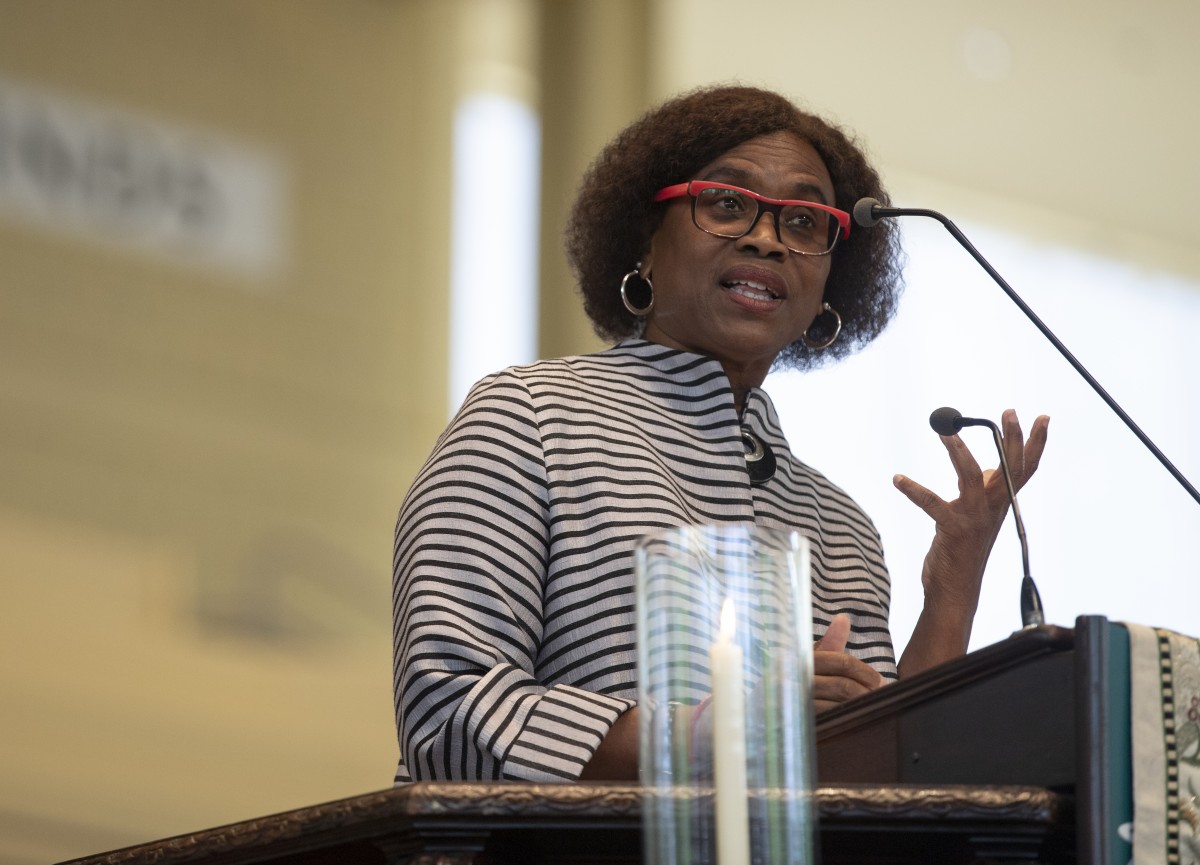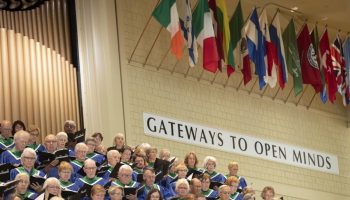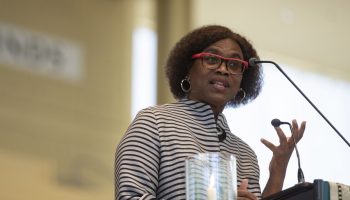When you love yourself enough to quit settling for too little, you can take the gift of your life seriously,” said the Rev. Irene Monroe at the 10:45 a.m. Sunday morning worship service on Aug. 12 in the Amphitheater.
“If you love yourself enough to feel all your feelings, you don’t mask those feelings with hateful acts,” Monroe said.
Monroe’s sermon title was “Healing Our Personal ‘isms,’ ” and the Scripture text was Luke 13:10-17, the healing of a woman bent over for 18 years.
In a time of shared struggle for human acceptance, Monroe said her sermons for the week will be reflections on history and memory.
There is an old African story, she said, about the lost people of Sumer. A young person asked an old man, “What happened to the black people of Sumer?”
The old man sighed and said, “They lost their history, so they died.”
Sunday’s service took place on the first anniversary of the Charlottesville riot, and Monroe remembered Heather Hyer, who was killed when a car plowed into a crowd of people protesting a white supremacist rally.
Heather’s father, Monroe said, told the news media that his daughter died for her beliefs. Her mother told them that “she died fighting for what she believed in.”
“How do we tell the truth about the Robert E. Lee statutes in 2018?” Monroe said.
Usually the victors write the history of any conflict, but in the case of the Civil War, she said, “The North won the war, but the South won the narrative.”
The South romanticized “The Lost Cause” as a fight by chivalrous gentlemen to protect the economic system being taken away from them. Secession was a “necessary evil” to protect state rights, and slavery was a benevolent system of government charity.
Early movies like “The Birth of a Nation” in 1915, “Gone With the Wind” in 1939 and even “Cold Mountain” in 2003 were part of the “Lost Cause” narrative, she said.
Monroe said Robert E. Lee told his soldiers to put away their uniforms and flags, and even Robert E. Lee V, his great-great grandson, said he was fine with the statues coming down and being put in museums.
“Eventually, someone is going to have to make a decision, and if that’s the local lawmaker, so be it,” he told CNN in 2017. “But we have to be able to have that conversation without all of the hatred and the violence.”
“How did we, who stand on Martin Luther King’s shoulders, get here in 2018?” Monroe said.
People have thought King’s vision of justice was just for African-Americans, but it was really much wider.
“Justice is more than legal or moral or racial, it is a revolution for human rights,” Monroe said. “It is opening unhealthy places and enabling healing.”
People talk about discrimination in the workplace, by churches, the state, families, but they don’t talk about “how we discriminate against ourselves,” Monroe said.
“We are not always cognizant of the pain we carry that causes the cracks in our lives,” she said.
She paraphrased Ernest Hemingway, saying that the world breaks us all, but some grow strong in the broken places.
“There is a sin-sick world out there,” she said, “and one we carry within us. There is work to be done for justice in the world, and we must do it as activists and healthy people.”
In Luke’s story, the woman who was bent over for 18 years did not have a medical diagnosis. The text did not mention osteoporosis.
“It was not a job-related injury like my relatives got from picking cotton,” Monroe said. “It was not ‘wasting’ disease that comes from bending all day on farms.”
The woman had a “spirit of infirmity.”
“When in your life and what in your life has caused a spirit of infirmity in you, that has caused you to bend over?” Monroe said.
She told the congregation that we carry, “knowingly and unknowingly, dreams deferred, shame and guilt, the inability to forgive, pain in the day-to-day struggle of life, pain in relationships that we hold on to for too long to get out.”
She called for an “Amen” from the congregation and received one.
The woman in Luke’s story was unnamed.
Monroe said this was not an “editorial omission, but a literary style.” The woman’s “name is our name, her condition is our condition.”
“We fool ourselves if we think the world is sick and we had nothing to do with it,” she said. “We fool ourselves if we think the world is in turmoil and we have nothing to do with it. We fool ourselves if we think we can heal the world and don’t heal ourselves. We fool ourselves if we think healing the world is only about racism, sexism, classism, anti-Semitism or Islamophobia and is not personal.”
Monroe said racism cannot be eradicated if white privilege is not understood. People have to learn how Protestantism contributed to anti-Semitism, anti-Catholicism and racism.
“Our unaccounted-for differences are used to divide us instead of uniting us,” she said.
Many people believe their lives are defined by their wounds and do little to heal themselves. Every new experience is defined in terms of those wounds.
“It is the culture of the wounded that keeps us bent over,” Monroe said. “We need a new language of intimacy to talk across and among our pains.”
People don’t talk as healthy people. Instead, they talk through their illness. Monroe said that makes healing difficult.
Jesus saw the bent woman and immediately connected to her life with the laying on of hands.
Because people have a spirit of infirmity, Monroe said, people have the ability to heal.
“I love the verse in Luke 4:23, ‘Physician, heal thyself.’ There is power in ourselves to heal,” she said. “Do you want to be healed?”
Monroe used her own life as an example. She has been with her spouse for about 20 years, but before that, she would “meet and date the craziest women in Boston.”
“I thought there was an invisible placard over my head that said, ‘You crazy? Irene is looking for you,’ ” she said.
Then she had an epiphany — “a light bulb moment, as Oprah calls it” — when she realized she was broken and did not know she was bent over.
“We do better social justice and being a ‘woke’ Christian when we stop transferring hate into the world,” she said.
Monroe said that when people adopt “self-love,” they stop drinking, doing drugs, getting into reckless relationships and making impulsive decisions.
When people are anxious, fearful or sad, they discover who needs them. Monroe said, “You need you.”
“It is not selfish of you to meet your own needs,” she said. “You no longer live with ridicule, shame and guilt, but with love, patience and grace.”
It is when you love yourself that you can pass love on to others.
“I worry today about Charlottesville and Washington, D.C., and I hope that no more will die at the hands of white supremacists,” she said.
She said she did not think there were many white supremacists at Chautauqua, but she had two questions for the congregation.
“How are you white, and how white are you?” she said. She gave the congregation three pieces of advice.
First, a lyric from Michael Jackson’s song “Man in the Mirror” — “take a look at yourself.” Second, from the Chautauqua Prays for Peace with Compassion daily ritual — “Let it begin with me.” Third, from Martin Luther King’s dream — “the longing for social justice and the longing for God are inextricably tied to the longing for personal healing.”
The Rt. Rev. V. Gene Robinson, vice president of religion and Chautauqua’s senior pastor, presided. Christopher James Dahlie, who has served as head of audio for the Amphitheater for 19 years and last week received his Ph.D. from the University of North Carolina, read the Scripture. The Chautauqua Choir was joined by the Chautauqua Music Camp Orchestra to provide special music. Jared Jacobsen, organist and coordinator of worship and sacred music, played the piano for the anthem “Sanctus” from Leonard Bernstein’s MASS. He was joined by the percussion section of the orchestra. Edward Leonard, founder and music director of the Chamber Orchestra of Pittsburgh and music director of the Pittsburgh Philharmonic, conducted the Music Camp Orchestra in the world premiere of “Whisper,” written by 20-year-old Alexander “Sacha” Voinov for the Music Camp Orchestra and in memory of Rita Pinyot.
A former member of the Youth Chamber Connection in Pittsburgh, Voinov is currently studying neuroscience and pre-med at Duke University. This is the sixth year that the Youth Chamber Connection has premiered a piece by Voinov at Chautauqua. The offertory anthem was “The Lord is My Shepherd” by Will Todd. The orchestra accompanied the choir. The organ postlude was “Allegro” from Symphonie VI by Charles-Marie Widor. The Samuel M. and Mary E. Hazlett Memorial Fund and the John William Tyrrell Endowment for Religion provide support for this week’s services.





